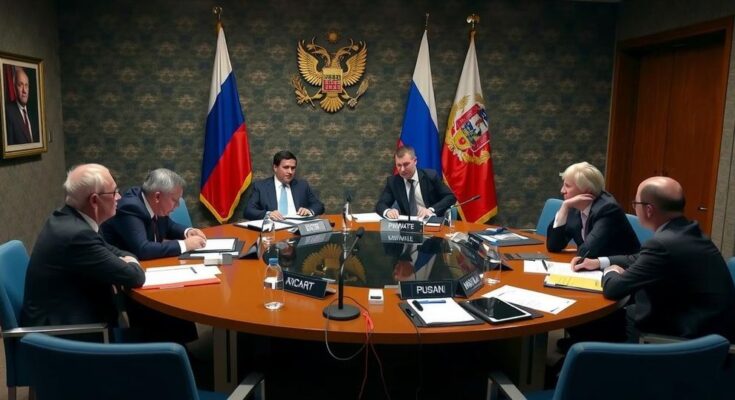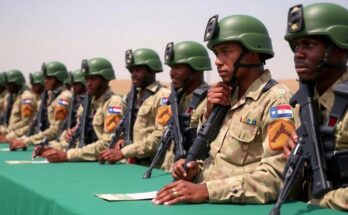Russia’s veto at the UN against a ceasefire resolution for Sudan has drawn harsh criticism from the UK and US, with calls highlighting the dire humanitarian crisis. The veto reflects complex geopolitical dynamics, as both Russia and Sudan dispute external interference amid ongoing violence in the country. The situation poses significant challenges for international efforts aimed at alleviating the humanitarian crises caused by the civil war.
In a contentious session at the United Nations, Russia exercised its veto power against a resolution championed by the United Kingdom and Sierra Leone that sought to impose a ceasefire in Sudan amidst a devastating civil war that has persisted for 19 months. This conflict has resulted in unprecedented humanitarian crises, with tens of thousands dead and over 11 million displaced from their homes. British Foreign Secretary David Lammy vehemently denounced Russia’s actions as disgraceful, while the US accused Moscow of obstructing peace efforts and pursuing its political agenda at the expense of Sudanese lives. The draft resolution proposed by the UK called for an immediate cessation of hostilities from both the Sudanese army and the Rapid Support Forces (RSF), urging the parties to respect previous accords aimed at civilian protection and to initiate discussions for a national treaty. Notably, the resolution highlighted RSF’s violent actions in Darfur and other regions. The veto, however, garnered support from the remaining 14 Security Council members, illustrating a significant rift in international diplomacy concerning Sudan’s ongoing crisis. Russian representatives defended their stance by claiming that the UK was attempting to intrude on Sudan’s sovereignty, while Sudan’s UN envoy expressed dissatisfaction with the draft’s omissions, including calls for the condemnation of support from the United Arab Emirates for the RSF. This deliberation underscores the complexities of international responses to crises and the different narratives surrounding sovereignty and humanitarian intervention in Sudan. The backdrop of the conflict involves a power struggle between the Sudanese army and the RSF, which erupted in April last year. Both factions have been implicated in severe human rights abuses potentially qualifying as war crimes, exacerbating the humanitarian situation for millions of Sudanese citizens. The ongoing dysfunction and violence have prompted criticism of global bodies, particularly the United Nations, for their slow and inadequate responses to the mounting crisis. In summary, the recent veto of a crucial ceasefire resolution in the UN Security Council by Russia has sparked intense debate and condemnation from Western nations, complicating efforts to mitigate the dire humanitarian situation in Sudan. The move reflects broader geopolitical tensions and raises questions about the efficacy of international intervention in instances of humanitarian crises. “This Russian veto is a disgrace and it shows to the world yet again Russia’s true colours” – David Lammy. “I ask the Russian representative in all conscience… How many more Sudanese have to be killed? How many more women have to be raped? How many more children have to go without food before Russia will act?” – David Lammy. “Shame on you, the UK!” – Dmitry Polyanskiy. “We wanted a clause condemning the United Arab Emirate’s backing of the RSF… We also wanted the RSF classified as terrorists” – Al-Harith Idriss al-Harith Mohamed.
The Sudanese conflict ignited in April 2022, leading to a prolonged civil war between the Sudanese army and the notorious Rapid Support Forces (RSF). As violence escalated, the humanitarian conditions deteriorated significantly, resulting in the deaths of tens of thousands and displacing millions. The international community, primarily through the United Nations, has sought to intervene and propose ceasefire agreements, yet the complexities of the situation are compounded by geopolitical interests from global powers, notably Russia and the United States, which have influenced security resolutions. This context is critical to understanding the gravity of the recent UN veto and the reactions it has elicited from various countries.
The recent veto by Russia at the UN Security Council against a UK-led resolution calling for a ceasefire in Sudan has reignited tensions within international diplomatic circles. The repercussions of this action not only impede immediate humanitarian support but also reflect deeper geopolitical divides. With millions at stake and an ongoing humanitarian disaster, the need for a unified international response is evident, indicating the challenges faced when national interests and humanitarian needs collide.
Original Source: www.bbc.co.uk




